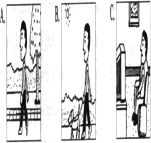题目内容
听力测试(本大题共20分,每小题1分)
第一节(共10小题)
听下面10段短对话,每段对话后有一个小题,从题中A、B、C三个选项中选出最佳选项。听完每段对话后,你都有10秒钟的时间来回答有关小题和阅读下一小题。每段对话读两遍。
听第1至10段材料,回答第1至10题。
1.What did Tom enjoy doing before?
A.

B.

C.

2.How does George usually go to work?
A.
![]()
B.
![]()
C.
![]()
3.What did the woman do first?
A.

B.

C.
![]()
4.Which floor does Steven live on?
A.

B.

C.

5.When will the film begin?
A.At 7∶55 p.m.
B.At 8∶00 p.m.
C.At 8∶05 p.m.
6.How long has Mrs Green had the hat?
A.More than three years.
B.Less than three years.
C.Just three years.
7.Where is Mr.Read now?
A.In Nanjing.
B.In Shanghai.
C.At home.
8.How much money can the woman borrow from Jack?
A.50 yuan.
B.80 yuan.
C.20 yuan.
9.Who will be good friends?
A.Mary and John.
B.Mary and Jane.
C.John and Jane.
10.Where did the woman live before she moved?
A.In the factory.
B.Near the factory.
C.In a house on West Street.
第二节(共10小题)
听下面3段长对话和短文,每段对话和短文后有几个小题,从题中A、B、C三个选项中选出最佳选项。听每段对话和短文前,你将有时间阅读各个小题,每小题5秒钟,听完后,每小题将给出5秒钟的作答时间。每段对话和短文读两遍。
听第11段材料,回答第11、12题。
11.What does Mary want to do?
A.Walk in the street.
B.Stand in the cold wind.
C.Go walking in the park.
12.When does the conversation (对话) most probably take place?
A.Early in the morning.
B.Late in the morning.
C.Late in the afternoon.
听第12段材料,回答第13至15题。请根据短文内容,选择正确答案,完成信息记录表。

13.A.Eating differently
B.Eating manners
C.Eating habits(习惯)
14.A.eat less
B.eat more
C.eat well
15.A.noisily
B.quietly
C.comfortably
听第13段材料,回答第16至20题。
16.What did the writer and the Englishman talk about at first?
A.The weather.
B.English idioms(惯用语).
C.Studying English.
17.Has the Englishman ever been to the Great Wall?
A.Yes, he has.
B.No, he hasn't.
C.We don't know.
18.How many times has the writer misunderstood(误解)the Englishman?
A.Once.
B.Twice.
C.Three times.
19.What did the Englishman mean when he said “You don't say!”?
A.He asked the writer not to talk about it.
B.He didn't agree with the writer.
C.He wanted to express(表达)interest, surprise, etc.
20.What did the writer plan to do at last?
A.To learn more about spoken English.
B.To be careful with English idioms.
C.To learn from the foreigners(外国人).
解析:
初二英语期中考试听力材料
第一节(共10小题)
听下面10段短对话,每段对话后有一个小题,从题中A、B、C三个选项中选出最佳选项。听完每段对话后,你都有10秒钟的时间来回答有关小题和阅读下一小题。每段对话读两遍。
听第1至10段材料,回答第1至10题。
1.W:What do you like to do after school, Tom?
M:I was fond of playing badminton before I came to this school, but now I'm crazy about reading books.
2.W:Were there too many people on the bus this morning, George?
M:I don't know.I came to work on foot this morning.I didn't take the bus as usual.
3.M:What did you do when you saw the bridge was broken?
W:I stopped the cars behind me and then called the police.
4.W:Steven, do you live in a flat on the tenth floor?
M:No, I live on the seventh floor.My cousin Peter lives on the tenth floor.
5.W:It's 7∶50 p.m.now.Hurry up, or we'll be late for the film.
M:Your watch is fifteen minutes fast.We still have twenty-five minutes to go.
6.M:Oh! You have a nice hat, Mrs Green!
W:You won't believe it.I bought it three and a half years ago.
7.W:Has Mr.Read returned from Shanghai?
M:Yes.But he stayed at home for only five days.Then he was sent to work in Nanjing.
8.W:I want to buy an e-dictionary.It's one hundred and ninety yuan.Can you lend me fifty yuan, Jack?
M:I had one hundred yuan, but I've just spent eighty yuan on the CDs.
9.M:Mary, I'll introduce my good friend Jane to you.
W:Oh, thanks, John.I'll be glad to meet her.
10.M:Where are you living now? I went to your house on West Street, but nobody was in.
W:I'm living near the factory.I moved there last week.
第二节(共10小题)
听下面3段长对话和短文,每段对话和短文后有几个小题,从题中A、B、C三个选项中选出最佳选项。听每段对话和短文前,你将有时间阅读各个小题,每小题5秒钟,听完后,每小题将给出5秒钟的作答时间。每段对话和短文读两遍。
听第11段材料,回答第11、12题。
M:Hello, Mary.Why are you standing here in the cold wind?
W:I'm waiting for a bus, but the buses are very full at this time of the day.
M:Where are you going? This isn't your way home.You must take a bus from the other side of the street to go home.
W:I'm not going home now.I'm going for a walk in the park.I always like to go for a walk before lunch.
M:Then why aren't you going to the park on foot? It's not very far.
W:Oh, no, Bill.It isn't interesting to walk in the streets.So I always take a No.3 bus.
听第12段材料,回答第13至15题。
Eating habits are different in different countries.The Chinese have a saying “Eat good things for breakfast, eat a big meal for lunch, but eat less at dinner.” Many Americans agree that one should start the day with a good breakfast, but their ideas about lunch and dinner are different.They eat a small lunch.Also a quiet dinner at home with all the family talking about their day is a way to take a good rest after a long, hard day of work.
Eating at restaurant is also different.In China, people like to talk and laugh while eating.In America it is not like this.They want a quiet place where they can eat a good meal far away from the noises of the outside world.
听第13段材料,回答第16至20题。
One day, I happened to meet an Englishman in the street and soon we began to talk.As I was talking about how I was studying English, the foreigner gently shook his head and said, “You don't say! You don't say!” I was puzzled, and I thought, “Perhaps this is not a right thing to talk about”, so I said to him, “Well, shall we talk about the Great Wall? Have you ever been there?”
“Certainly, everyone back home will laugh at me if I leave here without seeing it.The Great Wall is wonderful!” “Yes, it is one of the wonders in the world.And people of many countries have come to visit it.” As I went on telling him more about it, he stopped me again, “You don't say!”
So I asked, “Why do you tell me not to talk about it?”
“Well, I didn't ask you to do so,” he answered, greatly surprised.
“Didn't you say ‘You don't say!'?” I asked again.
Hearing this, the foreigner laughed loudly.He began to explain, “ ‘You don't say!' means ‘Really?'”
Wow! How foolish I was! I must be careful with English idioms later on.



























